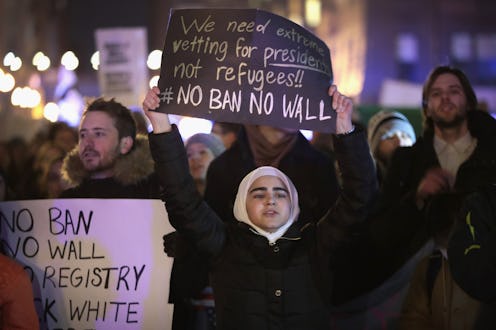News
A Reminder That The SCOTUS Travel Ban Decision Could Be Temporary

On Monday, the Supreme Court agreed to hear two legal challenges to President Trump’s travel ban. Eventually, the court will rule on whether the president has the authority to ban citizens from seven Muslim-majority countries from entering the U.S. In the meantime, however, the Supreme Court allowed parts of the travel ban to be implemented while the broader legal challenges make their way through the courts.
This is as big of a victory as Trump has had yet on the ban, which has been blocked repeatedly by multiple lower courts on both Constitutional and statutory grounds. But it's only a partial victory, and it could — depending on how the justices rule on the merits of the law — end up being a temporary one.
Several lower courts have blocked all of Trump's travel ban from taking effect, but they've done so for different reasons. The 4th Circuit Court of Appeals issued an injunction against the order Trump signed on the grounds that the order probably violates the Constitution, while the 9th Circuit Court of Appeals determined that the order violates not the Constitution, but Trump's statutory authority as president. Both courts blocked the entire travel ban from taking effect as a result of their determinations.
SCOTUS agreed on Monday to hear both of these challenges to the travel ban. (That is, the constitutional one and the statutory one). It also agreed that the ban can't be implemented in its entirety until the court rules on these larger legal questions. However, the justices also ruled that the 4th and 9th Circuits went too far in blocking every element of the travel ban, even though they only did so on a temporary basis.
So SCOTUS will allow a limited version of the ban to take effect. While the executive orders that Trump signed (both the original and revised versions) blocked all citizens of several Muslim-majority countries from entering America, the Supreme Court's ruling only allows the administration to block citizens living overseas "who have no connection to the United States at all." But if those citizens "have a credible claim of a bona fide relationship with a person or entity in the United States," they'll be able to enter the U.S..
This means that, for instance, overseas citizens of the named countries who have family members living in the U.S. will be allowed to visit them. Likewise, foreign nationals enrolled in American universities will be able to leave the U.S. and then come back under the terms of the ruling.
However, terms like "credible claim" and "bona fide relationship" are subjective, and this could easily result in more lawsuits. Incidentally, this was a concern to three of the most conservative justices (Samuel Alito, Clarence Thomas, and Neil Gorsuch), who argued in a dissenting opinion that implementing only part of the ban would "invite a flood of litigation." It's especially unclear how, if at all, Monday's ruling applies to refugees.
In any event, SCOTUS didn't rule on the merits of the case on Monday. It will do so at a later date, and that will be the true test of Trump's travel ban. For now, the court simply allowed what one might call a watered-down version of the policy to take effect.